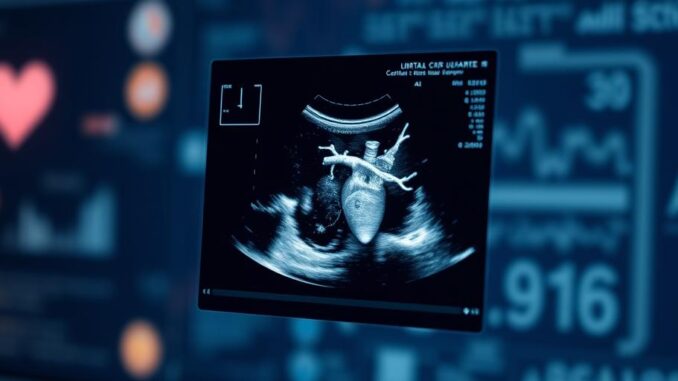
Summary
AI is revolutionizing cardiac diagnostics by significantly reducing ultrasound scan times, improving diagnostic accuracy, and increasing workflow efficiency. This technology empowers clinicians with varying levels of experience to obtain high-quality images, leading to faster diagnoses and better patient care. The future of cardiac ultrasound is bright, thanks to AI’s transformative potential.
Healthcare data growth can be overwhelming scale effortlessly with TrueNAS by Esdebe.
** Main Story**
AI is making waves, and it’s no longer just a buzzword; it’s actively reshaping industries. And healthcare is no exception, particularly in cardiac ultrasound. You’re probably already seeing it – AI-driven ultrasound is rapidly becoming the new standard, promising faster scans and, crucially, more accurate diagnoses. Think about that for a second: lives potentially saved because of quicker, more reliable technology.
Speed and Precision: A Game Changer
Traditional cardiac ultrasound scans can really eat into your time, right? I mean, depending on complexity, you’re looking at anywhere from 20 to 50 minutes. The real kicker? It’s so reliant on the sonographer’s skill. Which means a degree of subjectivity, and, well, we’re all human; errors can happen.
But AI? It’s changing that. By automating image analysis, recognizing key anatomical structures, and even guiding the user in real-time, it’s a powerful assistant. I saw a demo recently where the AI highlighted potential issues I might have missed myself. It was pretty impressive. It dramatically cuts down on inconsistencies between operators and delivers consistently high-quality images, no matter the clinician’s experience. That means faster diagnoses, quicker interventions, and ultimately, better results for patients. It’s pretty straightforward.
Leveling the Playing Field: Access for All
Now, here’s something I’m really excited about. AI-guided ultrasound is democratizing access to imaging. And why is that important? Because it empowers clinicians, even those with limited ultrasound experience, to acquire precise images, this is especially critical in resource-constrained environments where access to specialized expertise might be a challenge, or even non-existent.
Consider those portable, AI-powered ultrasound devices, like the ones supported by the Bill & Melinda Gates Foundation. They’re putting cardiac ultrasound within reach of nurses and midwives. Imagine the impact: Earlier detection of cardiovascular issues, potentially preventing serious complications before they even happen. Talk about a game changer. It really makes you think, doesn’t it, about how technology can bridge those healthcare gaps?
The Future is Now, and It’s AI-Powered
Look, the integration of AI into ultrasound isn’t just a minor upgrade; it’s a fundamental shift. What’s not to like about high-quality images acquired quickly and accurately? It enhances workflow efficiency, minimizes patient anxiety from lengthy scans, and optimizes resource utilization. I remember one patient telling me how relieved she was that her scan was over so quickly; she’d been dreading it all week!
And here’s the thing: AI’s potential in cardiac ultrasound is only growing. We can anticipate even more precise and personalized cardiac care, leading to better patient outcomes and a brighter future for cardiac diagnostics. As this technology develops, its likely we’ll see more and more new applications. It’s exciting to think about, don’t you think?


AI reading ultrasounds reminds me of those personality quizzes online. “Does your heart beat faster near puppies? Then you’re definitely an aorta!” Seriously though, democratizing diagnostics with AI is pretty incredible. What other specialized medical fields could benefit from this “AI assistant” approach?
That’s a hilarious analogy! You’re right, the democratization aspect is a huge deal. I think radiology, with its reliance on image interpretation, is another area ripe for AI assistance. Imagine AI flagging subtle anomalies in X-rays or MRIs, helping doctors catch things earlier!
Editor: MedTechNews.Uk
Thank you to our Sponsor Esdebe
The point about democratizing access is key. How might AI-guided ultrasound impact preventative cardiac care in underserved communities where specialists are scarce? Could we see a shift towards more proactive, community-based screening programs?
Great question! The potential for community-based screening programs is huge. AI-guided ultrasound could empower local healthcare workers to identify high-risk individuals early, even without specialized training. This could lead to earlier interventions and improved outcomes in underserved areas, shifting the focus from reactive treatment to proactive prevention. It is exciting to think about!
Editor: MedTechNews.Uk
Thank you to our Sponsor Esdebe
The discussion of AI-guided ultrasound democratizing access is vital. How might these advancements integrate with existing telehealth platforms to reach even more remote populations and further enhance preventative care?
Great point about telehealth! Combining AI-guided ultrasound with telehealth platforms could revolutionize remote cardiac care. Imagine real-time AI assistance guiding healthcare workers in remote areas, with specialists reviewing results virtually. This could dramatically improve preventative care access and outcomes. Thanks for sparking this important discussion!
Editor: MedTechNews.Uk
Thank you to our Sponsor Esdebe